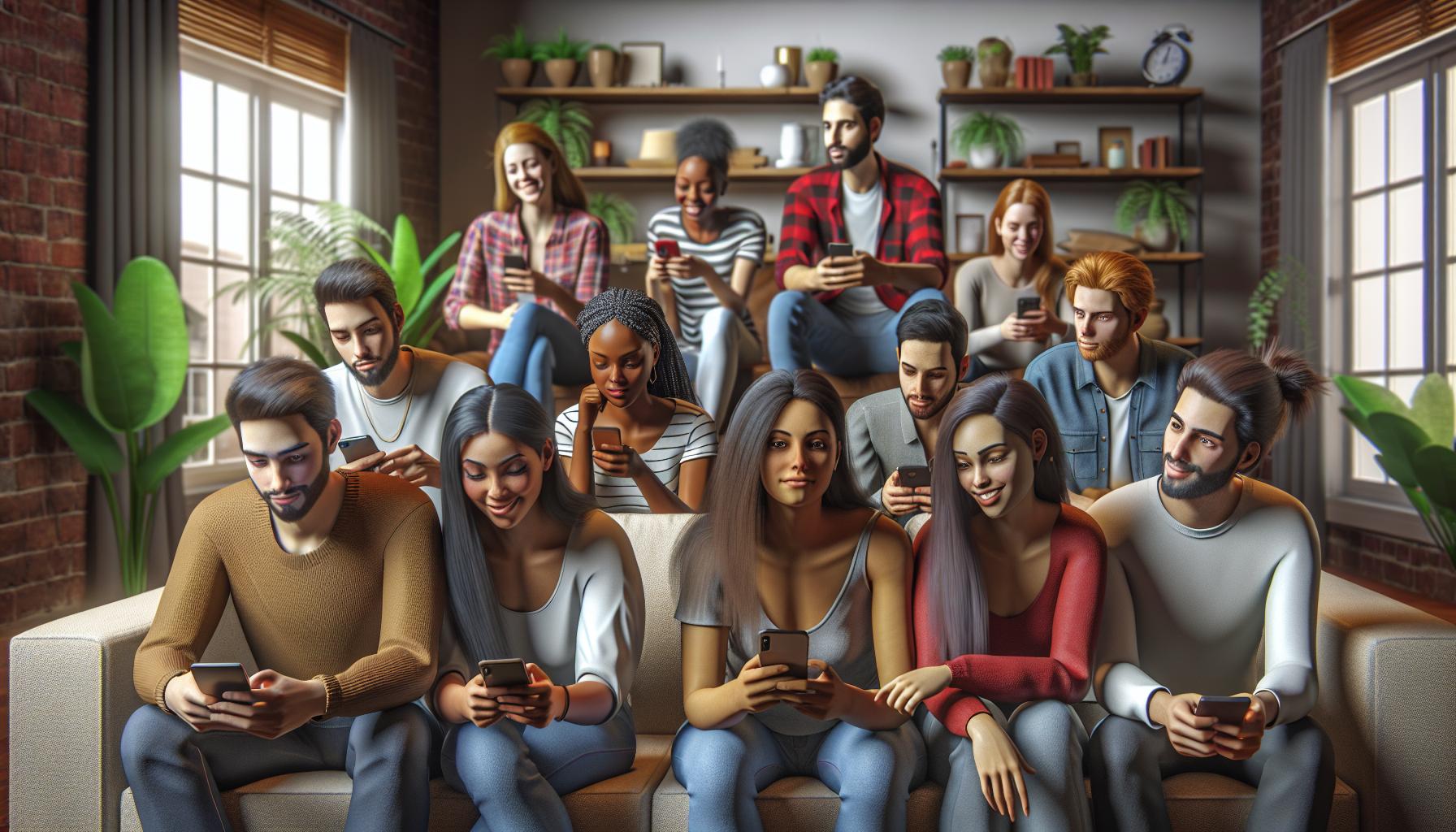In today’s digital landscape, social media has become an integral part of daily life, shaping how individuals perceive themselves and others. With platforms overflowing with curated images and highlight reels, it’s no wonder that many struggle with self-esteem. The constant comparison to seemingly perfect lives can lead to feelings of inadequacy and self-doubt.
As users scroll through feeds filled with likes and comments, the quest for validation often overshadows genuine self-worth. Understanding the link between social media and self-esteem is crucial for navigating this complex relationship. By exploring the psychological impacts and social dynamics at play, individuals can gain insights into how to cultivate a healthier self-image in an ever-connected world.
Key Takeaways
- Impact of Social Media on Self-Esteem: Social media shapes self-perception, often leading to feelings of inadequacy through constant comparison with curated lifestyles.
- Role of Peer Comparisons: Frequent peer comparisons on social media can distort self-image and negatively influence self-esteem by fostering feelings of envy and dissatisfaction.
- Positive Aspects: Social media can also uplift self-esteem by providing access to supportive communities and inspirational content that encourages personal growth and resilience.
- Cyberbullying Effects: Cyberbullying on social platforms exacerbates feelings of worthlessness, anxiety, and depression, significantly damaging self-esteem.
- Healthy Usage Strategies: Setting boundaries and fostering a positive online environment can mitigate the adverse effects of social media, promoting a healthier self-image.
- Awareness and Self-Compassion: Understanding the intricate relationship between social media and self-esteem is crucial for developing self-compassion and a balanced perspective in a digital world.
How Social Media Affects Self Esteem
Self-esteem refers to how individuals perceive their worth and value. It influences behaviors, relationships, and overall mental health. Understanding self-esteem’s complexities is crucial to navigating its impacts, especially in the context of social media.
The Psychology of Self Worth
Self-worth stems from internal and external evaluations. Internally, individuals derive self-worth from personal achievements and intrinsic qualities, while externally, societal standards and feedback from others shape perceptions. Social media platforms amplify these external influences by exposing users to idealized representations of others’ lives. Frequent exposure can lead to negative self-assessment, fostering feelings of inadequacy.
Factors Influencing Self Esteem
Several factors contribute to self-esteem levels:
- Social Interactions: Positive and negative interactions with friends and family can heavily influence feelings of self-worth.
- Achievements: Accomplishments in academic and professional realms enhance confidence and self-perception.
- Media Representations: Media portrayals set unrealistic standards, often distorting self-image.
- Peer Comparisons: Comparing oneself to others on social media can create a distorted self-view, impacting self-esteem negatively.
- Feedback: Likes, comments, and shares can lead to validation or criticism, influencing emotional health.
- Personal Beliefs: Deeply held beliefs about self-worth affect how individuals perceive their abilities and value.
The Role of Social Media

Social media significantly influences self-esteem by shaping how individuals view themselves in relation to others. Various platforms facilitate this dynamic, with each serving unique functions that impact users’ self-perception.
Social Media Platforms Overview
- Facebook provides a space for social connections, sharing updates, and engaging with friends and family. Public interactions can lead to validation or disappointment depending on the feedback received.
- Instagram emphasizes visual content, showcasing curated images that often present an idealized version of life. Users frequently compare themselves to these images, affecting feelings of self-worth.
- Twitter serves as a news and opinion platform, where interactions and likes may influence users’ perceptions of their beliefs and relevance. Quick feedback can reinforce self-image or create doubts.
- TikTok promotes creativity through short videos, allowing users to seek approval from followers. Viral trends can enhance visibility but also pressure users to conform to specific standards for validation.
The Connection Between Social Media and Self Esteem
Social media fosters both positive and negative effects on self-esteem. Positive feedback through likes and comments can boost confidence, reinforcing individuals’ sense of self-worth. Constant exposure to idealized portrayals can lead to unrealistic expectations, resulting in self-criticism.
Users often engage in social comparisons, evaluating their lives against peer accomplishments. In cases where they perceive themselves as falling short, negative implications for self-esteem arise. Evidence suggests excessive social media use correlates with higher levels of anxiety and depression, further decreasing self-esteem.
Awareness of these dynamics encourages individuals to cultivate a more balanced view of social media, promoting self-compassion and reducing the adverse effects on self-esteem.
Positive Effects of Social Media

Social media offers various benefits that can enhance self-esteem, fostering environments where individuals feel valued and supported. The platforms serve as powerful tools for connection and inspiration.
Building Supportive Communities
Building supportive communities on social media can significantly elevate self-esteem. Individuals often connect with like-minded users who share similar interests or experiences, creating safe spaces for support and encouragement. For instance, forums and groups focused on mental health allow members to share challenges and triumphs, fostering a sense of belonging. Such communities act as a buffer against negative self-perception, reassuring individuals of their worth through shared experiences and validation from peers.
Access to Inspirational Content
Access to inspirational content further uplifts users’ self-esteem. Social media platforms are abundant with motivational stories, quotes, and imagery that encourage personal growth and resilience. Users frequently follow accounts that promote positivity, diversity, and self-improvement, which can shift focus away from negative comparisons. For example, influencers and public figures often share their journeys of overcoming adversity, inspiring others to embrace their unique paths. This type of content emphasizes self-acceptance and encourages users to recognize their strengths, contributing to a healthier self-image.
Negative Effects of Social Media

Social media can significantly harm self-esteem through various mechanisms, primarily involving comparison and cyberbullying. Understanding these negative effects is crucial for navigating the digital landscape.
Comparison and Envy
Comparison and envy stem from social media’s curated nature, where users often present an idealized version of their lives. Users frequently encounter images and posts that promote standards of beauty, success, and happiness that are unrealistic. This exposure fosters feelings of inadequacy as individuals measure their lives against the seemingly perfect portrayals of others. Studies indicate that frequent social comparison correlates with lower self-esteem, particularly among adolescents. Moreover, environments that encourage envy can lead to resentment towards others, intensifying a sense of isolation and dissatisfaction with one’s own life.
Cyberbullying and Its Impact
Cyberbullying amplifies feelings of worthlessness and despair. Victims of online harassment experience increased anxiety, depression, and social withdrawal. The anonymity of social media enables bullies to target individuals without immediate repercussions, resulting in pervasive emotional distress. Research shows that individuals who experience cyberbullying display significantly lower levels of self-esteem. Furthermore, the public nature of most social media platforms means harmful comments become visible to a wider audience, exacerbating the impact on the victim’s self-worth. Addressing cyberbullying is essential for fostering a healthier online environment and protecting individuals’ self-esteem.
Strategies for Healthy Social Media Use
Utilizing social media effectively can mitigate its negative effects on self-esteem. Implementing strategic approaches can promote a more positive online experience.
Setting Boundaries
Setting boundaries can help individuals manage their social media consumption effectively. Users can establish specific time limits for daily usage to reduce exposure to harmful content. Regular breaks from social media can prevent burnout and allow for real-life interactions to enhance well-being. Users can also choose to unfollow accounts that generate negative feelings or promote unrealistic standards. Engaging selectively with content can foster a healthier online experience and help maintain self-esteem.
Fostering a Positive Online Environment
Fostering a positive online environment can significantly impact self-esteem. Individuals can connect with supportive communities that share common interests and values. Following accounts that promote body positivity, mental health awareness, and self-acceptance can cultivate a more uplifting feed. Engaging in constructive discussions and sharing positive experiences can contribute to a supportive atmosphere. Individuals can also report harmful content or bullying, actively contributing to a healthier social media landscape.
Navigating The Digital Landscape Healthily
Social media undeniably shapes self-esteem in profound ways. While it can offer validation and foster supportive communities, it often promotes unrealistic comparisons that lead to feelings of inadequacy. Understanding these dynamics is crucial for navigating the digital landscape healthily.
By setting boundaries and engaging with positive content, individuals can mitigate the adverse effects of social media. It’s essential to cultivate self-compassion and recognize one’s worth beyond online interactions. Embracing a balanced approach can empower users to enjoy the benefits of social media while protecting their self-esteem from its pitfalls.